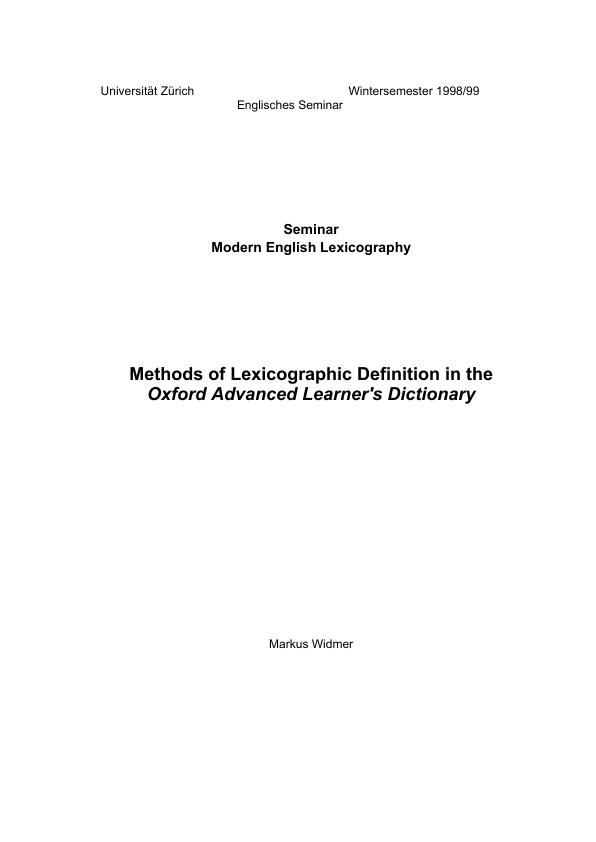In this paper, 80 lexicographic definitions from the Oxford Advanced Learner's Dictionary are classified and evaluated, the basic question being the following: are similar words defined in similar ways? The words are classified according to part of speech, concreteness and word frequency, and eight different ways to define a word are considered. The study confirms that concreteness and part of speech have a considerable impact on the way a particular word is defined in the ALD.
Table of Contents
- Introduction
- Aim and Scope
- Material
- Corpuses
- Word Selection
- Part of Speech
- Word Frequency
- Concreteness
- Dictionary
- Corpuses
- Method
- Investigation
- Defining 'Lexicographic Definition'
- The Term 'Definition'
- Lexicographic Definitions in Dictionary Entries
- Classification of Lexicographic Definitions
- Synonymous Definitions
- Analytic Definitions
- Synthetic Definitions
- Implicative Definitions
- Denotative Definitions
- Ostensive Definitions
- Regular Definitions
- Analysis
- Problems of Classification
- Distinctiveness
- Analytic and Synthetic Definitions
- Synonymous Definitions
- Remaining Difficulties
- Results
- Parts of Speech
- Concreteness
- Word Type Groups
- Word Type Groups
- Problems of Classification
- Conclusion
- References
Objectives and Key Themes
This paper aims to classify and evaluate 80 lexicographic definitions from the Oxford Advanced Learner's Dictionary (ALD) and contribute to a typology of lexical paraphrases or definitions. It seeks to determine whether the lexicographers adhere to traditional rules and assumptions regarding definition methods and whether the ALD reflects a coherent linguistic theory.
- Classification of lexicographic definitions used in the ALD.
- Evaluation of the distribution of different definition methods across various word types.
- Exploration of the ALD as a potential representation of a linguistic theory.
- Comparison of the observed definition methods with established lexicographers' manuals.
- Analysis of the relationship between the types of definitions and the headwords they define.
Chapter Summaries
- Introduction: This chapter introduces the research topic, outlining the lack of empirical studies on the distribution of lexicographic definition methods and highlighting the need for investigation. It mentions relevant existing work, emphasizing the potential for this paper to contribute to a typology of lexical paraphrases or definitions. The chapter also discusses the role of dictionaries in reflecting linguistic theories, emphasizing that the ALD will be examined for its underlying theoretical assumptions.
- Aim and Scope: This chapter defines the research goals, outlining the three aspects considered when differentiating between word types: part of speech, word frequency, and concreteness. It describes the creation of eight word type groups and the investigation of whether lexicographers adhere to the principle of varying definition techniques based on word type. The chapter also clarifies the scope of the study, focusing solely on denotation and excluding other semantic aspects such as connotation, register, and collocations. It further emphasizes that the study investigates only the ALD, with comparisons to other dictionaries left for future research.
- Material: This chapter details the corpus used for word selection, focusing on the MRC Psycholinguistic Database and its availability of information about various linguistic properties. It explains the selection of three specific properties: part of speech, word frequency, and concreteness. The chapter further discusses the importance of part of speech in understanding word usage and the principle of substitutability as a guiding principle for lexicographers.
Keywords
The main keywords and focus topics of the text include: lexicographic definitions, Oxford Advanced Learner's Dictionary (ALD), word types, part of speech, word frequency, concreteness, denotation, linguistic theory, lexicographers' manuals, empirical study, typology of lexical paraphrases, and definition methods.
- Quote paper
- Mag. Markus Widmer (Author), 1998, Methods of Lexicographic Definition in the Oxford Advanced Learners Dictionary, Munich, GRIN Verlag, https://www.grin.com/document/14777




